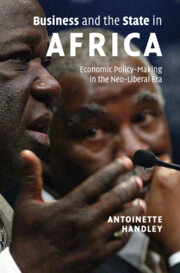Book contents
- Frontmatter
- Contents
- List of figures
- Acknowledgments
- List of abbreviations
- Introduction: the African business class and development
- Part one Institutionalizing constructive contestation
- Part two Business and the neo-patrimonial state
- Conclusion: the business of economic policy-making, comparatively speaking
- Bibliography
- Index
Conclusion: the business of economic policy-making, comparatively speaking
Published online by Cambridge University Press: 22 September 2009
- Frontmatter
- Contents
- List of figures
- Acknowledgments
- List of abbreviations
- Introduction: the African business class and development
- Part one Institutionalizing constructive contestation
- Part two Business and the neo-patrimonial state
- Conclusion: the business of economic policy-making, comparatively speaking
- Bibliography
- Index
Summary
An ambitious shopkeeper class, urban homogenization … and intense minority group problems on the one side give a quite different picture than … a fusion of political and economic elites … and the confinement of business activities to a small percentage of the population give on the other.
In a classic study, Clifford Geertz reflects on the differences between two very different Indonesian towns, one dominated by peddlers, the other by princes. Modjokuto, on the one hand, is a market-centered society with an extraordinarily energetic commercial life characterized by “vigorous competitive interaction.” The Muslim traders are somewhat marginal to the political life of the town but their industry forms the dynamic core of its economic life. By contrast, in Tabanan, “it has not been the bazaar but the palace which has stamped its character upon the town.” Here the political elites are dominant, and they would like to parlay their political power into economic power too. The danger is that “Tabanan's firms can become easily politicized in modern terms and this is … extremely dysfunctional to further growth or even to continued solvency.”
The same phenotypes are evident in the griot's account of two sons of a Malian king: “the younger preferred fortune and wealth and became the ancestor of those who go from country to country seeking their fortune” while “the elder chose royal power and reigned.”
- Type
- Chapter
- Information
- Business and the State in AfricaEconomic Policy-Making in the Neo-Liberal Era, pp. 242 - 263Publisher: Cambridge University PressPrint publication year: 2008

